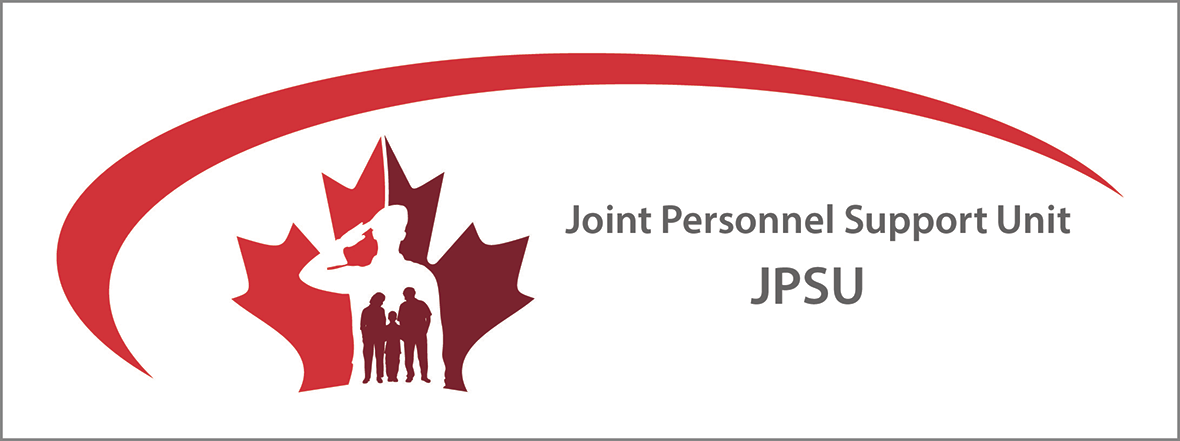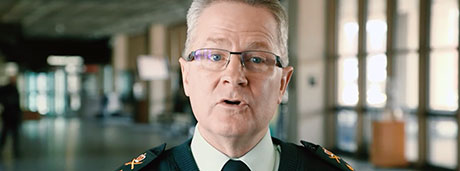You're not alone - Mental Health resources for CAF members and families
Canadian Armed Forces members have access to a range of programs while serving in the Forces, including exceptional medical and mental health care, support for families, and comprehensive reintegration and return-to-work programs for those who are ill and injured.
Important contacts
We asked our Forces: What would you say to a friend or colleague who was considering accessing mental health services?
My experience was positive, both in terms of achieving desired outcomes and in terms of the discretion and tact of the team that helped me. I won’t say that there’s nothing to lose, but what you gain and the health benefits of going are far greater than any loss.
Mental Health Videos
Testimonials

“You want to talk? I'll listen. They [soldiers] need to understand that. I feel that's the best way, if we break it down to the chain of command: when you say it, mean it. The rank is off, we're listening to what your concerns are, or what you're having difficulty with.”
Master Warrant Officer Anthony Jones
Defence leadership statements
Minister and Associate Minister of National Defence
Minister and Associate Minister of National Defence
“We place a high priority on the wellbeing of our military members, Veterans, and their families. Prevention is the first line of defence against mental illness, and comprehensive treatment is available for those suffering from mental health issues.”
—Harjit S. Sajjan, Minister of National Defence, and
Kent Hehr, Minister of Veterans Affairs and
Associate Minister of National Defence
Chief of the Defence Staff
Chief of the Defence Staff
“I am committed to ensuring that the mental wellbeing of our men and women in uniform is a priority. CAF leadership provides responsive support services and programs for the needs of our members, and I commend the men and women who seek the treatment and help they need in order to be their best selves.”
— General Jonathan Vance, Chief of the Defence Staff
Care and support
Care and support
- Canadian Armed Forces Mental Health Services
- Road to Mental Readiness
- Strengthening the Forces: The CAF's Health Promotion Program
- The Guide to Benefits, Programs, and Services for CAF Members and their Families
- Canadian Forces Morale & Welfare Services At a Glance
- Morale and Welfare Services Directory
- Operational Stress Injury - Social Support
For Families
For Families
FAQ
FAQ
Mental Health: Questions & Answers
- What are CAF wait times for mental health care?
- Where can I get advice on dealing with mental illness?
- I’m not comfortable talking about mental health with my chain of command, what should I do?
- If I raise my hand to get help, will I automatically be released from the CAF?
- What can I expect if I get posted to the Joint Personnel Support Unit?
- What is the Member Assistance Program?
- How can I tell if someone is considering suicide?
- Someone I know needs help – what emergency mental health care is available to CAF members?
- What information is used in tracking and analyzing suicide rates?
- Does the CAF monitor veteran suicide rates?
- How are suicides investigated?
- Is the CAF planning any further studies into mental health rates?
- What is the Chain of Command’s role in dealing with mental illness?
What are CAF wait times for mental health care?
Walk-in or crisis assessments are treated the same day, usually within one hour of arriving at the base clinic.
The target wait time for a psychosocial assessment is two weeks. For general mental health assessments and Operational Trauma and Stress Support Centre assessments, the wait time is four weeks.
Strategies are in place to ensure members are properly and medically supported while waiting for their assessment appointment. These may include more frequent appointments, seeing another clinician with the primary care team or psychosocial services.
The CAF also has the flexibility to refer patients to pre-screened and pre-approved mental health clinicians in the community.
Where can I get advice on dealing with mental illness?
You can get personal guidance and advice for yourself or a loved one dealing with mental illness from your doctor, or by calling the Member Assistance Program or Family Information Line.
CAF members can call the Member Assistance Program at 1-800-268-7708. If you are seeking help for a family member or friend, call the Family Information Line at 1-800-866-4546.
Both services are confidential and available 24/7, 365 days a year. Always call 911 if it is an emergency.
I’m not comfortable talking about mental health with my chain of command, what should I do?
Call the Member Assistance Program at 1-800-268-7708 to talk to someone. This is a confidential service, available 24/7, 365 days a year.
If I raise my hand to get help, will I automatically be released from the CAF?
No. This is why anyone who has mental health concerns is encouraged to see a professional as soon as possible, who can assess what they are experiencing. Just as with physical health concerns, a delay in seeking help for a mental health issues may cause the condition to deteriorate to the point where it could impact on a member's long-term health and career.
When members come forward, the goal is to get the right kind of assistance and treatment to help them keep working, while receiving the specialized attention they need.
Often, members can receive mental health care while continuing to work in their regular position. Some members may need to be on sick leave for a time while they continue to work with a mental health provider, but then return to work. Others may be posted to the Joint Personnel Support Unit, if that is the best way for the member to focus efforts on recovery. Every individual is unique, and the course of action is selected accordingly.
Members are given time to recover and rehabilitate, with the goal of returning to work within the CAF. For some, however, a career within the civilian workforce may be more beneficial to their recovery.
Transition support
CAF members are transitioned to civilian life only when necessary, and then only when they are found to be mentally and physically prepared to do so. Additionally, they are provided with significant compensation, benefits and access to services such as the Transition Program, which helps make the transition to civilian life as stress free as possible.
What can I expect if I get posted to the Joint Personnel Support Unit?
The Joint Personnel Support Unit provides focused, individual assistance and helps expedite access to CAF and Veterans Affairs Canada programs, family support expertise, and peer support. Within the Joint Personnel Support Unit structure, there are 24 Integrated Personnel Support Centres across Canada.
These Integrated Personnel Support Centres include a platoon structure to provide military leadership, supervision, and administrative support, as well as staff focussed on the Return to Work program, tracking, administrative and advocacy services, Family Resource Centre liaison, and local base support representatives. This team with its supporting partners includes Regular and Reserve Force personnel, DND Public Service staff, Veterans Affairs personnel, an Operational Stress Injury Social Support (OSSIS) representative, a Family Liaison Officer and a health services case manager.
What is the Member Assistance Program?
The Member Assistance Program is a voluntary and confidential service, initiated by the CAF to help members (Regular Force, all Reserve Class Members, Cadets) and family members who have personal concerns that affect their personal well-being and/or work performance.
Call us at 1-800-268-770 for a confidential talk. If we can't help, we know someone who can. 24 hours a day, 365 days a year.
How can I tell if someone is considering suicide?
Some of the signs that someone may be considering suicide are:
- They have threatened to commit suicide or said they are thinking about suicide, especially if they seem to have a plan
- They have physically harmed themselves in some way
- They say they have no reason to live
- They have expressed feelings of hopelessness and despair
- They view themselves as a burden to others
- They have become distant or disconnected from family and friends
- They have recently experienced the loss of a relationship, a job or other disappointments
If someone threatens to commit suicide, or mentions they are thinking about it, always take them seriously and take action immediately to seek help. If it is an emergency or you think they may attempt suicide, call 911 and do not leave them alone.
Do not be afraid to ask a loved one if they are considering suicide. Opening up a dialogue can help them get the professional help they need.
Someone I know needs help – what emergency mental health care is available to CAF members?
CAF personnel have daily access to a general duty medical officer at the base medical clinic. Personnel in crisis can also see a primary care physician on a 'walk-in' basis, without an appointment. All primary care physicians have been trained in suicide assessment, management and prevention. Anyone assessed as at risk for suicide is seen immediately by a physician.
Further, all base medical clinics have a psychosocial services team available to personnel on a ‘walk in’ basis. Personnel in crisis can be seen by a social worker or a mental health nurse without an appointment. All psychosocial services clinicians and all mental health clinicians have training and expertise in assessing, managing and preventing suicide.
Personnel or the friends and family of someone in need of help can also call the military police or 911, who will respond on an emergency basis, and either bring the suicidal member to the base clinic during working hours, or to the local hospital emergency department after hours. Both military and civilian police and emergency services personnel are trained in mental health crises and in helping and managing the suicidal person.
Help is also available through the Canadian Forces Member Assistance Program at 1-800-268-7708, 24 hours a day, from anywhere in the world, and receive a confidential referral for mental health support.
What information is used in tracking and analyzing suicide rates?
All deaths of Canadian Armed Forces personnel that are identified to be the result of suicide by the coroner are investigated through a medical professional technical suicide review. The information collected is used to identify suicide rates and suicide risk factors, as well as to review the clinical care provided and assess for other organizational factors that could assist with suicide prevention.
Suicide rates for serving Regular Force male personnel have remained consistently lower when compared to those of the Canadian population since 1995 when we began closely tracking the rate. This could be explained by the fact that CAF personnel undergo health screening prior to enrolment and during their service, are fully employed in an organization with strong and engaged leadership, and have ready access to comprehensive mental health care.
Reserve Force suicides that are reported are also tracked and investigated. However, Reservists sometimes make limited contact with their unit and they receive their health care from the civilian health care in their communities , therefore the CAF cannot be certain that all suicide deaths are reported to the CAF.
Additionally, the low number of suicides among female CAF personnel makes the numbers statistically unstable and difficult to compare as a rate per 100 000 over time. Therefore, Regular Force male suicides are the most accurate to report and provide the best insight into the impact of suicide on the CAF population.
Does the CAF monitor veteran suicide rates?
A study released in the spring of 2011 looked at both serving and former CAF members together and the results showed the risk of suicide was comparable to the Canadian population. However, when considering the population of former CAF personnel alone, men in this group had a higher risk of suicide compared to the Canadian population. Further analysis identified the following associated risk factors: service before 1986, shorter period of service (less than 10 years), former Non‑Commissioned Member rank, and release for involuntary or medical reasons. For more information and initial mortality results, please visit Canadian Forces Cancer and Mortality Study.
How are suicides investigated?
Each suicide death in the CAF is investigated. The Canadian Forces National Investigation Service (CFNIS) investigates all sudden deaths, which occur within their jurisdiction, to determine if there was any foul play. The CFNIS gathers evidence and works with the coroner who then determines the cause of death. CFNIS investigations are conducted in accordance with Canadian police standards.
When the Canadian Forces Health Services (CFHS) is made aware of a suspected suicide, an initial medical record review is conducted. As autopsies are conducted under the jurisdictions of the responsible civilian coroner’s office, these offices are responsible for determining the official cause of death.
Once the civilian coroner has determined that a death is the result of a completed suicide and it has been reported to the CAF, the death will be included in the CFHS statistics and analysis for suicides. CFHS will then initiate a Medical Professional Technical Suicide Review (MPTSR). The MPTSR is an in-depth medical record review conducted by a two-person team (a General Duty Medical Officer and a Mental Health Professional). These clinicians interview family, friends, colleagues, the chain of command, and health care providers in order to determine whether there is anything to be learned from the circumstances surrounding the suicide. Lessons learned can be used to improve the CAF suicide prevention program or other health services programs.
A Board of Inquiry is also normally convened in cases where the cause of death is determined to be from self-inflicted means. Normally, the motivating factors that led to the event are among the issues examined during this process.
Is the CAF planning any further studies into mental health rates?
In March 2013, the Government announced the allocation of $4.6 million towards the 2013 Canadian Armed Forces Mental Health Survey. Statistics Canada representatives initiated this survey in March 2013 and contacted randomly selected Regular and Reserve Force personnel to participate in an hour-long interview. Participation in the survey was voluntary, and responses are confidential. The results of the 2013 Canadian Armed Forces Mental Health Survey will be available in 2014 and will be compared to the state of mental health in the general Canadian population as well as the results of the last survey of this nature which was conducted in 2002, prior to the mission in Afghanistan.
The results of this survey will help ensure that CAF mental health resources are targeted and allocated appropriately and that programs and services are meeting the unique needs of personnel. In particular, through comparison with the 2002 survey results, this survey will help measure the impact of the mission in Afghanistan and will provide insight about those who have not accessed care.
More information: 2013 Canadian Armed Forces Mental Health Survey
What is the Chain of Command’s role in dealing with mental illness?
A balance between the patient, the chain of command, and the health system is essential to the delivery of high-quality mental health care. This triad of care calls for CAF leaders to take visible measures to combat stigma, encourage prevention and education programs, openly talk about mental illness in the workplace, seek ways to improve mental health among their personnel, work closely with the medical community and support those who need help.
Reports & Publications
Reports & Publications
- Surgeon General’s Mental Health Strategy
- Caring for our Own
- Suicide in the Canadian Forces 1995 to 2012
- Report of the Canadian Forces Expert Panel on Suicide Prevention
- 2013 Canadian Armed Forces Mental Health Survey
- Canadian Forces Cancer and Mortality Study
- Cumulative Incidence of Post-Traumatic Stress Disorder and Other Mental Disorders
- Results from Health and Lifestyle Information Survey of Canadian Forces Personnel 2008/2009 (Regular Force Version)
- Archived—The CF 2002 Supplement of the Statistics Canada Canadian Community Health Survey
Note: The Canadian Forces Health Services respects the Official Languages Act and relevant Treasury Board policies, and is committed to ensuring all information on this site is available in both French and English. However, users should be aware that some of the research publications, abstracts and summaries are available only in the language in which it was provided.
Media
Media
- Government of Canada takes action to support mental health needs of military members, veterans, and their families
- Backgrounder - Caring for Our Own
- Backgrounder - Caring For Our Own: Compensation and Benefits Available to Ill and Injured Canadian Armed Forces Members
- Backgrounder - Medical Releases: Universality of Service and Support to Our ill and Injured
- Backgrounder - Suicide and suicide prevention in the Canadian Armed Forces
- Backgrounder - Mental Health Services in the Canadian Forces
- Backgrounder - Post-Traumatic Stress Disorder
- Backgrounder - Canadian Armed Forces Transition Program
- For the Record
- Reporting of suicides in the media
More Resources
More Resources
- Military Family Resource Centres
- CFOne Card
- Canada Company Military Employment Transition Program
- Veterans Affairs Canada
- OSI Connect
OSI Connect is a free mental health learning and self-management mobile app developed to help OSI patients and their families understand the nature of operational stress injuries (OSIs) and to provide help through the OSI Clinic Network across Canada. The resources on OSI Connect address challenges including post-traumatic stress and triggers, depression, anger, sleep problems, substance abuse, stress management and more.
- Date modified:
















